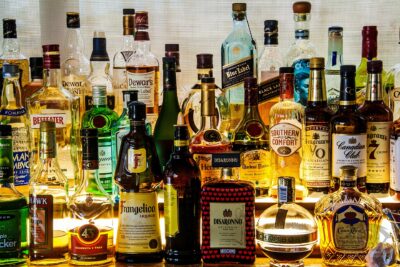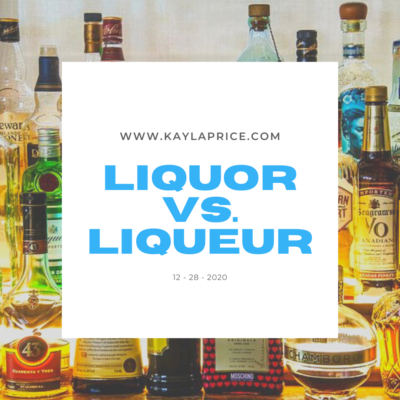
Spelling is not the only difference between liquor and liqueur, nor is one just a fancier term for the other. While both are alcohol, there are slight differences.
Liquor is a distilled alcohol (as opposed to fermented alcohol such as wine). Examples of liquor are whisky, tequila, vodka, rum, and gin.
Liqueur, on the other hand, may or may not be distilled, but does have a flavor added. Examples are amaretto (almond flavor), triple sec (orange flavor), and limoncello (lemon flavored). Other words of the same meaning are cordial or schnapps.
Often we hear liqueurs identified by their brand names rather than the flavor of the liqueur. Brands of liqueurs include Grand Marnier (orange liqueur), Cointreau (also an orange liqueur), Frangelico (hazelnut liqueur), and Chambord (raspberry liqueur). There are other brands of the same primary flavors, which may or may not have different recipes, thus different tastes. Licor 43 (which is a Spanish liqueur containing an infusion of 43 fruits, spices, and herbs) is a proprietary blend, so it has no comparatives. It would go by its brand name.
I shared a recipe for cranberry liqueur (also called cranberry vodka) in this post. To make cranberry liqueur, you can steep cranberries in vodka (of course the vodka is a liquor). This is a good example of the differences between the two words.
If we compare the etymology (the study of the history of words) of liquor and liqueur, we learn that liquor (pronounced likur – rhymes with purr) is a French word derived from a Latin word liquifacere meaning to dissolve. Liquor means liquid.
Liqueur is pronounced likoor – rhymes with door. It has the same etymology as liquor but is a more recent word. Some consider them interchangeable words, but in the United States, we create differences in meaning.
If you check the Macmillan Dictionary or the Merriam-Webster Dictionary, you will find that liqueur is shown to be pronounced both as likur and likoor, whereas liquor is shown to be pronounced likur. I would like for all of us to agree that we will only pronounce liqueur as likoor. Pinky promise? It would be a lot less confusing since we would know exactly which liquid we are referring to.
It is quite possible that the meanings and pronunciations are only meant to confuse us and make our heads spin, somewhat like the effect of drinking liquor or liqueur in large quantities can have on our heads as well!
Cheers! Salud! Here is mud in your eye! To read more about various toasts and their meanings read this post.

